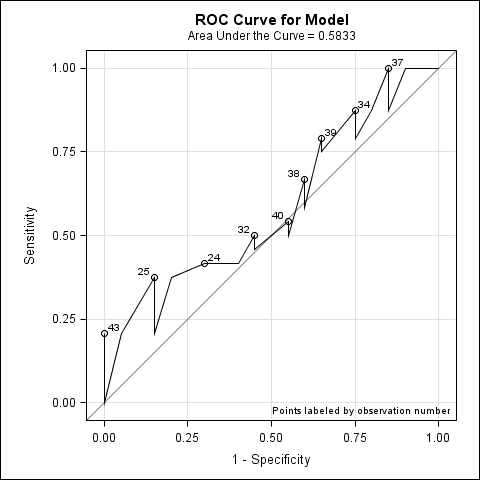- Home
- /
- Programming
- /
- Graphics
- /
- How to fix jagged ROC curves
- RSS Feed
- Mark Topic as New
- Mark Topic as Read
- Float this Topic for Current User
- Bookmark
- Subscribe
- Mute
- Printer Friendly Page
- Mark as New
- Bookmark
- Subscribe
- Mute
- RSS Feed
- Permalink
- Report Inappropriate Content
I'm having an issue with ROC curves when using ODS graphics and proc logistic: namely, the ROC graphs that are automatically generated appear very jagged and improper - see attached for an example. When I produce the ROC curve using proc gplot and the ROC output data generated by proc logistic, everything is fine - the ROC curves are all convex, and the graph doesn't "turn back on itself". Does anyone know why I'm getting these results? Thanks for the help!
Code producing Jagged Curves:
ods graphics on ;
proc logistic data=test_roc plots(only)=(roc(id=obs) effect) descending;
model disease(event='1') = test ;
run;
ods graphics off;
Code producing "nice" curves:
proc logistic data=test_roc descending;
model disease(event='1') = test / outroc=roc_data;
run;
proc gplot data=o1;
plot _sensit_*_1mspec_ /
ctext=black caxis=black vaxis=0 to 1 by .1 haxis= 0 to 1 by .1;
run;
quit;

- Mark as New
- Bookmark
- Subscribe
- Mute
- RSS Feed
- Permalink
- Report Inappropriate Content
Is this really the program you submitted? PROC GPLOT appears to be using a different data set (o1) than the output from LOGISTIC (roc_data).
- Mark as New
- Bookmark
- Subscribe
- Mute
- RSS Feed
- Permalink
- Report Inappropriate Content
Yes, sorry that is was a copy and paste mistake. Here's the proc gplot code:
proc gplot data=roc_data;
plot _sensit_*_1mspec_ /
ctext=black caxis=black vaxis=0 to 1 by .1 haxis= 0 to 1 by .1;
run;
quit;
- Mark as New
- Bookmark
- Subscribe
- Mute
- RSS Feed
- Permalink
- Report Inappropriate Content
you may want to include both the log and the second curve.
- Mark as New
- Bookmark
- Subscribe
- Mute
- RSS Feed
- Permalink
- Report Inappropriate Content
Ok will do, here is the log - I made an sgplot to generate the attached image.
805 ods graphics on ;
806 proc logistic data=test_roc plots(only)=(roc(id=obs) effect) descending;
807 model disease(event='1') = test ;
808 run;
NOTE: PROC LOGISTIC is modeling the probability that disease=1.
NOTE: Convergence criterion (GCONV=1E-8) satisfied.
NOTE: There were 44 observations read from the data set WORK.TEST_ROC.
NOTE: PROCEDURE LOGISTIC used (Total process time):
real time 0.70 seconds
cpu time 0.21 seconds
809 quit;
810 ods graphics off;
811
812
813 proc logistic data=test_roc descending;
814 model disease(event='1') = test / outroc=roc_data;
815 run;
NOTE: PROC LOGISTIC is modeling the probability that disease=1.
NOTE: Convergence criterion (GCONV=1E-8) satisfied.
NOTE: There were 44 observations read from the data set WORK.TEST_ROC.
NOTE: The data set WORK.ROC_DATA has 29 observations and 7 variables.
NOTE: PROCEDURE LOGISTIC used (Total process time):
real time 0.03 seconds
cpu time 0.03 seconds
816
817 proc gplot data=roc_data;
818 plot _sensit_*_1mspec_ /
819 ctext=black caxis=black vaxis=0 to 1 by .1 haxis= 0 to 1 by .1;
820 run;
821 quit;
NOTE: There were 29 observations read from the data set WORK.ROC_DATA.
NOTE: PROCEDURE GPLOT used (Total process time):
real time 0.32 seconds
cpu time 0.14 seconds
832
833 proc sgplot data=roc_data;
834 series x=_1mspec_ y=_sensit_;
835 run;
NOTE: PROCEDURE SGPLOT used (Total process time):
real time 0.24 seconds
cpu time 0.07 seconds
NOTE: Listing image output written to SGPlot1.png.
NOTE: There were 29 observations read from the data set WORK.ROC_DATA.

- Mark as New
- Bookmark
- Subscribe
- Mute
- RSS Feed
- Permalink
- Report Inappropriate Content
I don't see anything obvious. I am concerned that the small sample size may be an issue. It appears that you only have about 10 non-events, which is smaller than I would use for any logistic regression.
- Mark as New
- Bookmark
- Subscribe
- Mute
- RSS Feed
- Permalink
- Report Inappropriate Content
The example code I posted uses a "made-up" data set that I generated, but I've had this same problem with real data using sample sizes of about 200. The [proc logistic with ODS graphics] used to work just fine, but something happened and it's now generating these strange ROC curves. i.e. the two methods used to generate the graphs were able to produce the same curves. Not too sure what I did wrong. Thanks for the help though!
- Mark as New
- Bookmark
- Subscribe
- Mute
- RSS Feed
- Permalink
- Report Inappropriate Content
The ROC curve is supposed to be nondecreasing, so something is wrong. What version of SAS are you using? Contact SAS Technical Support and send them the data. I do not see any SAS Notes or Knowledgebase articles that describe this problem.
- Mark as New
- Bookmark
- Subscribe
- Mute
- RSS Feed
- Permalink
- Report Inappropriate Content
You didn't modify the ODS templates, did you?
- Mark as New
- Bookmark
- Subscribe
- Mute
- RSS Feed
- Permalink
- Report Inappropriate Content
I was having issues with Java - can't remember the exact errors I was getting - I must've changed something when fixing that. I'll try calling Tech Support and see what they say. Thanks!
Learn how use the CAT functions in SAS to join values from multiple variables into a single value.
Find more tutorials on the SAS Users YouTube channel.
SAS Training: Just a Click Away
Ready to level-up your skills? Choose your own adventure.



